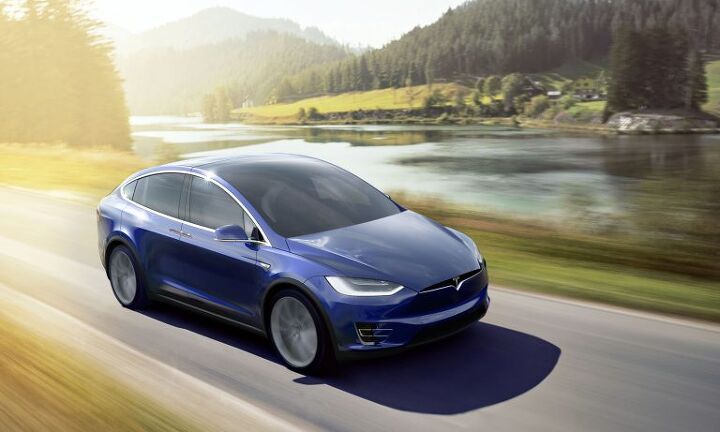Tesla Sues Michigan After State Bars Vehicle Sales

After its two-year-long bid to gain a sales foothold in Michigan hit a brick wall, Tesla has filed a lawsuit against the state.
The suit, filed in a U.S. District Court in Michigan, targets governor Rick Snyder and other top officials, Reuters reports.
Unlike other automakers, Tesla uses a direct sales model to get its vehicles to buyers, rather than a traditional franchised dealer network. That clashed with state laws forbidding the practice — laws passed in 2014 to exclude companies like Tesla from using a direct sales model.
Recently, Michigan denied Tesla a dealership license.
The lawsuit demands that Michigan officials hand over an order allowing the automaker to sell vehicles. Tesla, as well as its CEO, Elon Musk, wants it in writing that the company is “entitled to a vehicle dealer license.” Beyond that, it wants a judge to repeal the law that bars the company from operating in the state.
Tesla is able to operate stores in 23 states and the District of Columbia, but four states, including Michigan, have shut their doors. Other states have placed limits on the number of stores Tesla can operate.
In a statement reported by Reuters, Tesla blames existing automakers and protectionist policies for its market shutout.
“Unfortunately, the local auto dealers and local manufacturers have made clear that they oppose any law that would allow Tesla to operate in Michigan,” Tesla states. “As one leading legislator told Tesla: the local auto dealers do not want you here. The local manufacturers do not want you here. So you’re not going to be here.”
While its dealership application was shot down, Tesla has a used car license application that is still under consideration.
[Image: Tesla Motors]

More by Steph Willems


































Comments
Join the conversation
>> “As one leading legislator told Tesla: the local auto dealers do not want you here. The local manufacturers do not want you here. So you’re not going to be here.” Thanks, leading legislator. But what about the citizens/consumers? You know, the ones that elect you to represent them? You think they like being forced to buy from car dealers whether they want to or not?
"Thanks, leading legislator. But what about the citizens/consumers?" They just pay the legislator's salary, which they treat as an entitlement - but lobbyists ladle on the "gravy".
I understand protecting franchisees. If I had a Ford dealership I wouldn't want Ford to be able to come in and open their own store down the street. This is what Subway did years ago and they screwed a bunch of the small business owners that invested in franchises. They got their asses handed to them in court. However, since Tesla has never had franchisees, there are no independent businesses to protect. That is what the law in Michigan specifically said... until two years ago when Gov. Snyder and the GOP led legislature in the state changed the law. It used to require OEMs to sell through THEIR franchisees rather than directly, and it was changed to read that they had to sell through a franchised dealership. Now they are going to spend more taxpayer dollars to defend a lawsuit that is going to cost all of us a lot more than they made in payola from the dealer association. All the while, there are a lot more critical issues in the state. What I don't get, though, is that it doesn't require a dealer license to open a repair facility in Michigan. Why doesn't Tesla just open small service centers in the state. Sell directly online and deliver the cars over the border in Ohio or Indiana? Today, there are plenty of their cars driving around Michigan already but they are spending a fortune to truck them out of state for repairs. The two processes of selling vs. servicing have been tied together forever, but it isn't necessary. When Saturn first started their distribution network they awarded large geographies to each dealer rather than single points. The idea is that the dealers would compete with other manufacturers rather than with each other. However, the idea always floated around that a dealer could cover a geography with a small number of showrooms but open service satellites so that people in remote areas would be more comfortable owning one. It made sense... you would drive an hour once to buy the car knowing that warranty service was available nearby. The concept never went into practice as far as I know. Mostly because dealers had a very sales-oriented outlook. But it isn't as if they couldn't keep a car or two on site for test drives. Just call them service loaners.
I wish I could remember all the details, but it has been awhile. I know there was a big blow up about this a few years ago, then I read the actual law and what Michigan has done made total sense to me. Something like basically car companies must sell through a franchised, not company owned, dealership. I could argue that is a stupid law. But to allow Tesla to do it while not allowing anyone else is not equal treatment. And whatever Michigan did, again, from my memory of the situation, was simply clarify that there are no exceptions for anyone. So either Michigan changes their law for everyone or Tesla has to follow the existing laws like everyone else. I frankly do not see how Tesla has a case here.